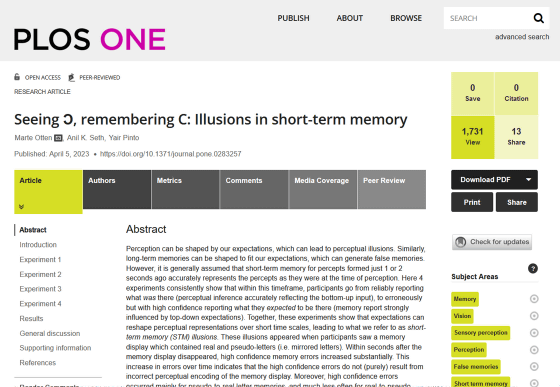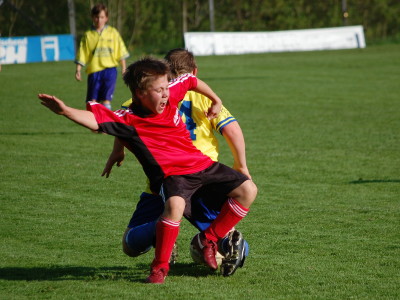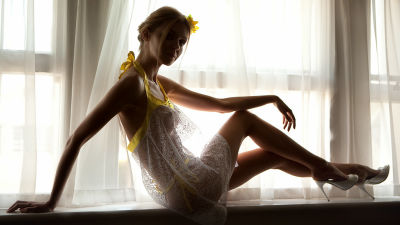Experiments reveal that humans create ``false memories'' in just a few seconds

Old memories are vague, and many people have the experience of ``mistaking false memories and fantasies as facts.'' However, an experiment conducted by a Dutch research team revealed that ``people can create false memories even if they saw something just a few seconds ago.''
Seeing Ɔ, remembering C: Illusions in short-term memory | PLOS ONE

False Memories Can Form Within Seconds, Study Finds
https://gizmodo.com/false-memories-can-form-within-seconds-study-finds-1850303900
Human memory may be unreliable after just a few seconds, scientists find | Neuroscience |
https://www.theguardian.com/science/2023/apr/05/short-term-memory-illusions-study
Studies over the past several decades have shown that human memory is highly imprecise, and it is not uncommon for memories to be fabricated for events that never existed. Much of the research on memory mistakes focuses on long-term memory, but a research team led by Marte Otten, a cognitive psychologist at the University of Amsterdam, worked on research to examine potential uncertainties in short-term memory. rice field.
Previous studies have shown that when presented with rotated or reversed letters, subjects often misidentify that they saw the correct shape of the letter. Researchers have thought that this phenomenon is a mistake in perception rather than memory, but Otten et al. We conducted several experiments on
In the first experiment, subjects who had confirmed they could complete a basic visual recognition task were shown a 'figure 1' consisting of six or eight letters arranged in a circle, and after the 'figure 1' disappeared, After 0.75 seconds or 3 seconds, we presented where in the circle the character was the target to be recalled. After 1.5 seconds or 3.75 seconds, a “Figure 2” with different characters from “Figure 1” is shown, and after “Figure 2” disappears, multiple candidate options are presented. I was asked to choose which character in 'Fig. 1' was the target. It is said that one or two of the characters displayed in this 'Fig. 1' and 'Fig. 2' had the alphabet reversed.

Also, 0.75 seconds after the disappearance of ``Fig. In both versions, subjects were asked to rate how confident they were in their answers on a four-point scale.

As a result of the experiment, the most common mistake made by the 23 subjects who frequently rated themselves as ``confident in their answers'' was the mistake in selecting the target character to be reversed or not reversed. However, when the target was reversed characters, 37% of the subjects answered ``I saw normal characters'', while when the target was normal characters, subjects said ``I saw reversed characters.'' The percentage of incorrect answers remained at 11%.
In addition to this, the research team showed subjects a picture of a mixture of normal characters and reversed characters, and conducted multiple experiments to recall specific characters later. A similar trend was observed in these experiments, and while the error rate was about 10% when the target was normal characters, the error rate reached a maximum of 40% when the target was reversed characters. That's what I'm talking about. In addition, the longer the time it took for the characters to be recalled after the disappearance of the characters, the higher the error rate, but it seems that this was also limited to the case where the target was reversed characters.
From these results, the research team concluded that the subject's mistakes were not due to ``perceptual errors'' due to visual similarity, but to ``short-term memory errors'' caused by prior knowledge of the alphabet. “Our memories may not be completely reliable, even for short periods of time,” Otten said. When it starts to fade a little, even after a few seconds, it begins to supplement its memory based on expectations.”“In other words, even though you saw the object correctly, as soon as you memorize it, it goes crazy. ' said.

Although this study was about 'characters' whose knowledge has been strengthened throughout life, Otten's research team decided to continue investigating whether similar phenomena can be seen in various other situations. I hope
``I'm interested in examining the effects of social knowledge, such as prejudices, stereotypes, and personal beliefs, on short-term memory,'' Otten said. Or will some data be misremembered after just a few seconds because it doesn't fit my beliefs about climate change?' 'These are six letters in a row. It's obviously a more complicated problem than getting people to look at the display, but I would like to continue my research.'
Related Posts:
in Science, Posted by log1h_ik







